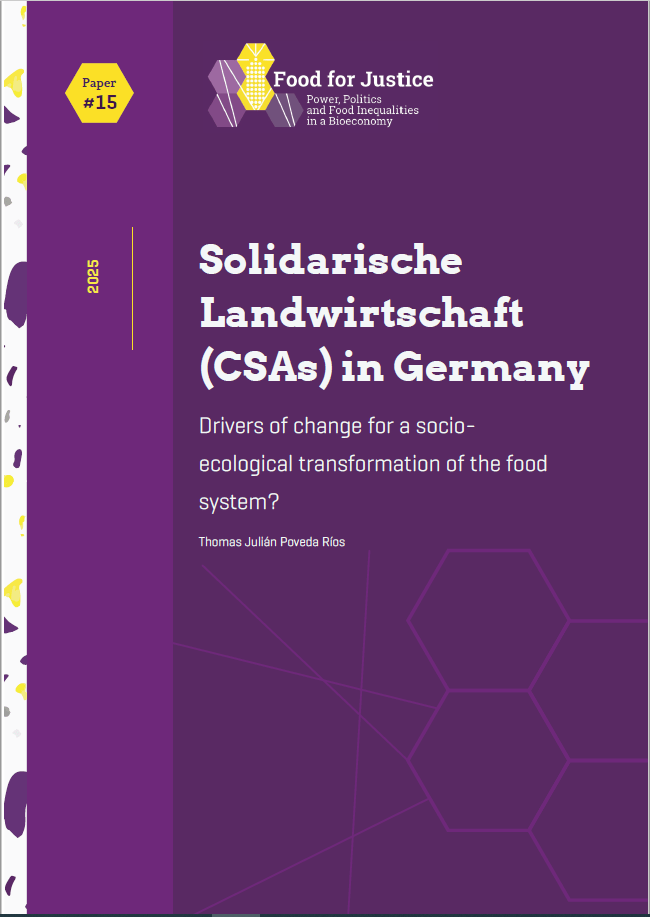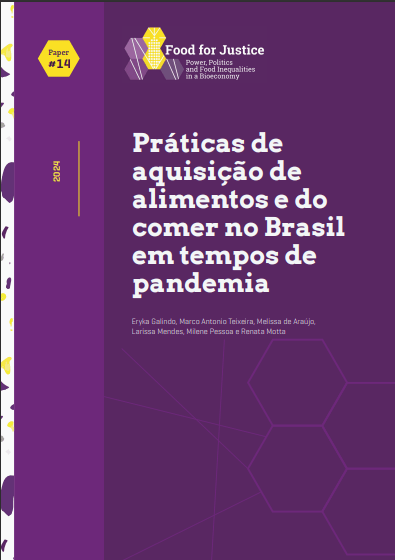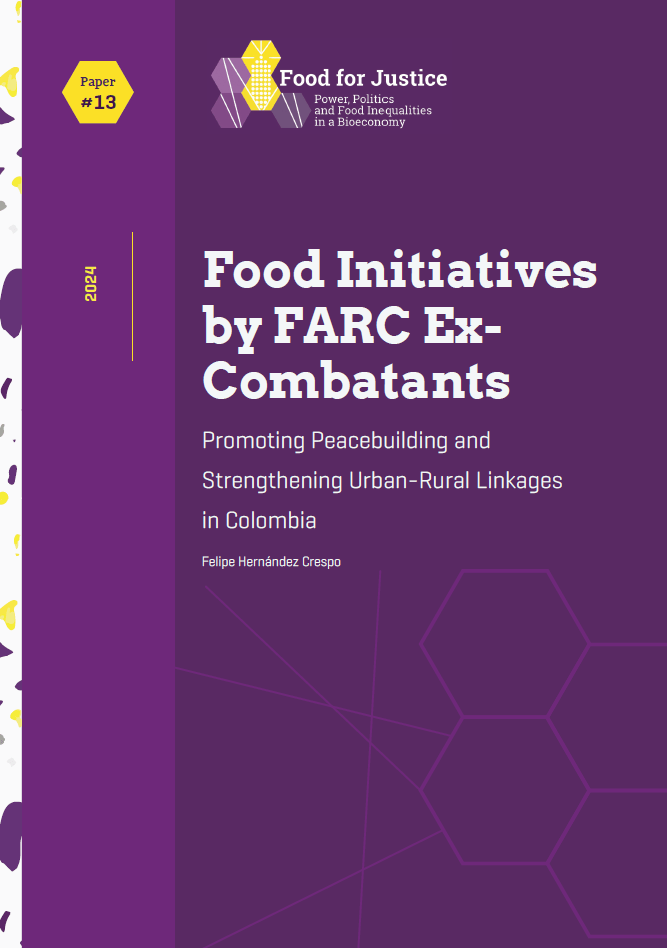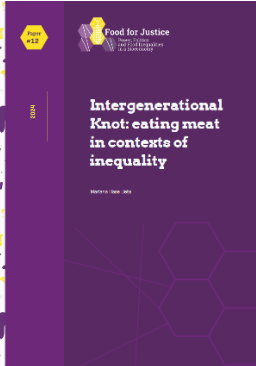Working Paper 15 • 2025
Solidarische Landwirtschaft (CSAs) in Germany: Drivers of change for a socio-ecological transformation of the food system?
Abstract
In face of a multiple crisis within the current corporate food system, alternative models of food production and distribution have attracted increasing attention as catalysts for a socio-ecological transformation. Among these alternative models, Community Supported Agriculture (CSA) or as it is called in Germany, Solidarische Landwirtschaft (Solawi), emerges as a promising model for reshaping the socio-ecological landscape of food production and consumption. By shedding light on the transformative potentials and limitations of Solawis in the framework of a socio-ecological transformation of the local food system this paper aims to share knowledge and a further perspective on the question “How are we going to feed the world?”, the leading question of this working paper series. Through semi-structured expert interviews conducted in fall 2023 within two case studies around Berlin, the Apfeltraum Solawi and the Spörgelhof e.G. and a subsequent qualitative content analysis this work shares relevant insights across diverse domains of Solawi work, such as community-building, relationship with nature, fair wages and ecological farming practices.
Working paper 14 • 2024
Práticas de aquisição de alimentos e do comer no Brasil em tempos de pandemia
Abstract
The Covid-19 pandemic impacted social relationships, including dynamics associated with food practices. This study aims to identify and analyze changes in food purchasing and eating practices in Brazilian households in the first year of the pandemic. The analysis is based on data from a representative public opinion survey of Brazil conducted through telephone interviews between November 21 and December 19, 2020. The results indicate changes in food purchasing and eating practices, with a decrease in the frequency of leaving the house to buy food (68.9%) and to have meals outside the home, either at commercial establishments (74.4%) or at the homes of acquaintances (72.9%). These downward trends, motivated by social distancing recommendations to curb virus spread, vary depending on socio-economic markers, notably gender, race, income, and food security status. Regarding food purchasing practices, the digital environment became more widely used, either through online shopping or supermarket apps with home delivery (e-commerce) or through food delivery services. This trend was observed among both users already familiar with these channels and new adopters. On the other hand, open-air markets were less frequented by respondents for food purchases in the first year of the pandemic, with a 66.1% decrease in frequency among those who used these services before the pandemic. This change in food purchasing practices may lead, on the one hand, to greater exposure to ultra-processed foods and meals with unfavorable nutritional profiles, and, on the other, reduced access to channels for fresh and healthier food. Finally, this trend also reinforces food purchases from large supermarket chains while weakening small-scale vendors at open-air markets.
Working Paper 13 • 2024
Food Initiatives by FARC Ex-Combatants: Promoting Peacebuilding and Strengthening Urban-Rural Linkages in Colombia
Abstract
This working paper explores how food initiatives led by FARC ex-combatants contribute to peacebuilding and strengthen urban-rural linkages in Colombia. The study investigates the motivations behind ex-combatants‘ involvement in food initiatives, examines the connection between economic reincorporation and peacebuilding, and analyses how food acts as a bridge, materialising peace between urban and rural communities. Using a multi-method approach, this paper provides an overview of FARC’s political trajectory, highlighting its shift from armed insurgency to peacebuilding actor. It further maps the landscape of ex-combatant food initiatives, analysing their scale, organisational structures, roles within the food system, and the intersectional categories that shape them. Findings indicate that ex-combatants often view food-related projects as integral to economic reincorporation, motivated by a blend of campesino heritage, former guerrilla identity, and established regional production knowledge and practices. This combination emphasises the importance of urban-rural linkages in shaping collective reincorporation processes. These food initiatives, grounded in principles of territorial peace, align with broader peacebuilding efforts, aiming to strengthen urban-rural connectivity. Ultimately, this research underscores the critical role of food systems in building lasting peace and highlights the voices and agency of ex-combatants in shaping their futures.
Working Paper 12 • 2024
Intergenerational Knot: eating meat in contexts of inequality
Abstract
The Anthropocene is not only a period of rapid environmental transformation but also a prolific moment of values changes. While the temporality dimensions of this phenomenon are a challenge to social sciences inquiry, it also presents a great opportunity for new methodologies to emerge. The intergenerational knot can be a useful methodological frame for understanding social change through the discussion of different values across different generations because, at the same time, it evidences differences and disagreement; it also carries the potential of mutually influencing and multiplying new food consumption practices. The present article focuses on intergenerational discussions through the case study of meat consumption. The young generation analyzed usually prioritizes environmental impact when choosing what to eat, however, other factors exert more significant influence on the family food consumption, such as their experiences of food deprivation, their views of what a “better life” consists, and their experience of social mobility. Therefore, first-hand ethnographic data was collected from university students who negotiated between personal values and family narratives around their household meat consumption in Campinas, São Paulo, Brazil. The intergenerational knot becomes a useful methodological frame to understand values change in social and environmental transformation processes in an inclusive way.
Working Paper 11 • 2024
Food Movements in Germany. Analysis of actors in the socio-ecological transformation of the food system
Abstract
Around the world, social movements are protesting against the corporate food regime (Friedmann & McMichael, 1989), denouncing the injustices associated with its structural dynamics of neoliberal capitalism, patriarchal domination, racism, coloniality, epistemic violence, and anthropocentric exploitation (Motta, 2021b; Holt Giménez & Shattuck, 2011; Holt-Gimenez & Patel, 2012). Many food movements are calling for a socio-ecological transformation and creating alternative forms to produce, share, prepare, consume and dispose of food, based on relations of care, solidarity and respect. In their heterogeneity, they provide a good analytical lens to explore the multiple and intersectional dimensions of food inequalities denounced and the directions of change desired by organized movements from civil society (Motta, 2021a). But which are the food movements that mobilize for a socio-ecological transformation of food politics in Germany? What are the main dimensions and intersections of inequalities addressed by them?
Based on an explorative mapping, this research identifies relevant food movements in Germany, their discourses and agendas. It takes as units of analysis food movements organizations with considerable collective actions and participation in social mobilization on a national scale during the last 5 years (2018-2023). Using an analytical framework elaborated in dialogue with theoretical and conceptual works on food movements, food inequalities, and dynamics of transformation in the food regime, the empirical data is presented along the categories: types of movements and activist discourses, time of emergence, juridical form, dimensions of food inequalities addressed, categories of intersectional inequalities considered, spatial locus of action (urban/rural), phases of the food system, sphere of social change most frequently targeted by the food movements. Based on the data, the dynamics of transformations are discussed.
Applying a qualitative and quantitative methodology which combined content analysis and coding, the research results in a mapping of the actors (Mayring & Fenzl, 2019; Saldaña, 2021). This working paper aims to give a first overview of food activism in Germany by assessing the actors in this field of social mobilisation and analysing their emancipatory potentials and limits.
Working Paper 10 • 2024
Kurzauswertung Befragung „Wir haben es satt!“ 2024
Abstract
The large-scale protest “We’re Fed Up!” organized by the My agriculture alliance has been taking place every year since 2011 at the start of the Green Week agricultural trade fair in Berlin. The alliance campaigns for sustainable and fair agriculture and food production and calls for a turnaround in agriculture and nutrition. “We’re fed up!” is one of the central case studies of the BMBF junior research group Food for Justice: Power, Politics and Food Inequalities in a Bioeconomy at the Heidelberg Center for Ibero-American Studies, Heidelberg University. The project investigates different axes of food inequalities, in various scales and spatialities, and their dynamics of reproduction and change in food politics. The case study “We’re fed up!” explores the key justice demands that mobilize citizens to denounce food inequalities and call for alternative food policies in different regions of the world. On January 20, 2024, researchers from Food for Justice conducted a survey with participants in the “We’re fed up!” protest with the support of volunteer interviewers. The collected data provides insights on the demographics of the protesters, their concerns, political attitudes, and how they contribute to supporting a different approach to agriculture through their consumption and lifestyle choices. This brief summary presents the methods and selected results of the survey.










